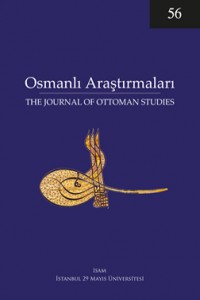Öz
Focusing on Luigi Ferdinando Marsigli’s neglected treatise, Bevanda asiatica (1685), this article explores knowledge exchanges between the Ottomans and Europeans in the late seventeenth century. Bevanda asiatica was based on Hezarfenn Hüseyin’s encyclopedic entry on coffee as well as on Marsigli’s own experiences both as a naturalist and as a slave-cook in Ottoman lands. Marsigli stated that Hezarfenn’s empirically driven depiction of the coffee plant was “the most original source” on coffee. By analyzing how and why Marsigli selected Hezarfenn’s text, this article sheds light onto the practices of cross-cultural knowledge exchanges in the early modernity.
Anahtar Kelimeler
coffee early modern Marsigli Hezarfenn knowledge exchange, natural history history of medicine
Kaynakça
- Dufour, Sylvestre: Traitez nouveaux et curieux du café, du thé et du chocolate, Lyon, 1688.
- Fantuzzi, Giovanni: Memorie della vita del Generale co. Luigi Ferdinando Marsigli, Bo- logna: L. dalla Volpe, impress. dell’ Istituto delle scienze, 1770.
Öz
Focusing on Luigi Ferdinando Marsigli’s neglected treatise, Bevanda asiatica (1685), this article explores knowledge exchanges between the Ottomans and Europeans in the late seventeenth century. Bevanda asiatica was based on Hezarfenn Hüseyin’s encyclopedic entry on coffee as well as on Marsigli’s own experiences both as a naturalist and as a slave-cook in Ottoman lands. Marsigli stated that Hezarfenn’s empirically driven depiction of the coffee plant was “the most original source” on coffee. By analyzing how and why Marsigli selected Hezarfenn’s text, this article sheds light onto the practices of cross-cultural knowledge exchanges in the early modernity.
Anahtar Kelimeler
coffee, Early modern Marsigli Hazerfenn Knowledge Exchange Natural History History of Medicine History of Science
Kaynakça
- Dufour, Sylvestre: Traitez nouveaux et curieux du café, du thé et du chocolate, Lyon, 1688.
- Fantuzzi, Giovanni: Memorie della vita del Generale co. Luigi Ferdinando Marsigli, Bo- logna: L. dalla Volpe, impress. dell’ Istituto delle scienze, 1770.
Ayrıntılar
| Birincil Dil | İngilizce |
|---|---|
| Bölüm | Makaleler |
| Yazarlar | |
| Yayımlanma Tarihi | 3 Aralık 2020 |
| Yayımlandığı Sayı | Yıl 2020 Cilt: 56 Sayı: 56 |


